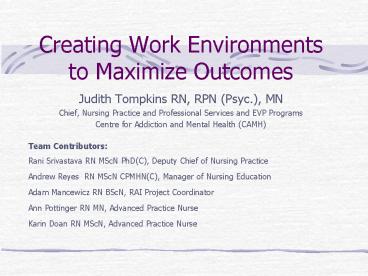Creating Work Environments to Maximize Outcomes - PowerPoint PPT Presentation
1 / 19
Title: Creating Work Environments to Maximize Outcomes
1
Creating Work Environments to Maximize Outcomes
- Judith Tompkins RN, RPN (Psyc.), MN
- Chief, Nursing Practice and Professional Services
and EVP Programs - Centre for Addiction and Mental Health (CAMH)
Team Contributors Rani Srivastava RN MScN
PhD(C), Deputy Chief of Nursing Practice Andrew
Reyes RN MScN CPMHN(C), Manager of Nursing
Education Adam Mancewicz RN BScN, RAI Project
Coordinator Ann Pottinger RN MN, Advanced
Practice Nurse Karin Doan RN MScN, Advanced
Practice Nurse
2
The CAMH Setting
- Merger of 4 main sites in Toronto, satellite
clinics, outreach programs and teams across
Ontario - Program emphasis in schizophrenia addictions
forensics child, family youth dual diagnosis
geriatrics emergency general women's mood
anxiety community support research - 554 RNs 211 RPNs 2663 Staff 315 Physicians
- 20,160 unique clients 400,000 out-pt. visits in
2004-2005 fiscal year
3
Two Key Priorities
- I RAI Mental Health Resident Assessment
Instrument a concrete tool unique to MH at
this point speaks to our retention strategy - II Diversity a broad CAMH initiativefits
with our international grad efforts addresses
our values and recruitment strategy
4
I RAI -MH
- A standardized assessment tool used in inpatient
mental health that produces outcomes measures and
triggers for certain conditions - Contains Outcome Scales and MHAPS
- which flow into eIPCC (electronic
interdisciplinary plan of client care) - An Ontario Ministry of Health requirement Oct.
2005
5
RAI MH Late Career Initiative
- Objective to increase the quantity and quality of
completed RAIs - Used the late career strategy to develop peer
facilitators - 9 peer facilitators (a title the nurses chose
to give themselves) received extensive education
and support - 10 week initiative
6
RAI MH Late Career Initiative
- The peer facilitators worked on specific units
individually or in pairs to discuss RAI with
their nursing colleagues - Focus of education on the tool itself, and also
on the fundamental competencies of assessment and
care planning
7
RAI MH Late Career Initiative
- RESULTS
- Being re-energized
- Reinforcing abilities and talents through
rediscovery - Regaining respect
- Reflecting on the whole picture
- Refreshing ongoing learning
- Recognizing options around late-career decisions
8
II Cultural Competence in Clinical Care
- Cultural competence valued but elusive concept -
lacks clarity and definition - Organizational commitment to diversity included
initial education for all CAMH staff to focus on
awareness - Difficult to translate awareness to application
in practice
9
Cultural Competence in Clinical Care
- Purpose of initiative to assist clinicians to
move from awareness to application - Clarify expectations and opportunities in
practice - Build clinicians knowledge of the main
components of cultural competence
10
Cultural Competence in Clinical Care
- Awareness.
- New eyes
- New ears
- New thoughts
- New actions
11
Quadripartite Framework
Awareness
Knowledge
EQUITY
Power
Skills
12
The Program Key Features
- 3 half-day sessions 2 weeks apart
- Day 1 Building on Cultural Awareness
- Day 2 Cultural Considerations in Assessments
- Day 3 Care Planning
- Small interdisciplinary groups
- Participatory format
- Facilitated by clinicians
- Use of existing clinical tools RAI, IPCC
13
Levels of Cultural Competence
- Individual (Micro)
- Organizational (Macro)
TEAM CULTURE
TEAM PROCESSES
Critical to Focus on the Meso / Middle level
14
Cultural Competence in Clinical Care
- RESULTS AND LESSONS LEARNED
- 59 interdisciplinary staff, predominantly nurses,
participated in the education - Clinicians reported increased clinical
discussions regarding cultural needs of clients - Use of Quadripartite Framework facilitated
clinicians reflection on power within clinical
relationships and settings - Integration without additional clinical tools
- Diverse planning group
15
Next Steps
- Culturally Responsive Therapeutic Relationships
Initiative - E-IPCC / RAI linkage
- OHA 2005 presentations on the above achievements
16
Sample Survey Questions
- 1. My ability to identify and confirm what is
meaningful and concerning to each client - I have no experience with this
- I have no experiences with this, but have seen
others do this - I have tried this a few times
- I do this on a regular basis
- I could teach others how to do this
- Others would consider me an expert
17
Sample Survey Questions(continued)
- 2. My ability to hear each clients life story
- I have no experience with this
- I have no experiences with this, but have seen
others do this - I have tried this a few times
- I do this on a regular basis
- I could teach others how to do this
- Others would consider me an expert
18
Sample Survey Questions(continued)
- 3. Which of the following people have helped you
to understand and establish Culturally Responsive
Therapeutic Relationships? (You can pick more
than one) - Clients and their families
- Nursing colleagues
- Student colleagues
- Colleagues from other disciplines
- Management/Faculty
19
RAI-MH MHAPs































